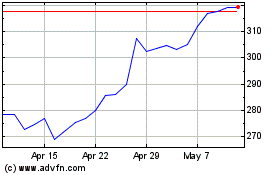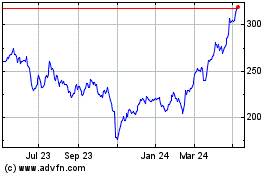BOE to Toughen Stress Tests for Large U.K. Banks
October 21 2015 - 6:50AM
Dow Jones News
LONDON—The Bank of England on Wednesday said it will toughen
"stress tests" of the U.K.'s largest banks but gave a reprieve to
major global banks such as J.P. Morgan Chase & Co. and
Citigroup Inc. by delaying plans to include their U.K. arms in the
annual health checks.
The BOE had previously said large U.K. units of foreign banks
would have to undergo the tests, which assess whether banks have
enough capital to withstand economic and market shocks. In its
reversal on Wednesday, it said it will instead rely on cooperation
with banks's home regulators such as the U.S. Federal Reserve to
assess the U.K. divisions.
It left the door open to eventually including foreign investment
banks in tests that would cover the whole of the U.K. financial
system, including insurers and hedge funds, but didn't give a
timeline for when that might happen.
For the eight British banks undergoing the tests—Barclays PLC,
HSBC Holdings PLC, Standard Chartered PLC and Royal Bank of
Scotland Group PLC,, Lloyds Banking Group PLC, Santander U.K.,
Co-operative Bank PLC and Nationwide Building Society—the minimum
capital needed to pass will rise from next year. The levels will
vary from bank to bank, reflecting individual capital requirements
set by the Bank of England and additional buffers for the country's
four systemically important global banks—Barclays, HSBC, RBS and
Standard Chartered.
Public stress tests started last year in Britain. The results of
this year's tests, using the old criteria, will be published on
Dec. 1.
The British stress test regime will also start assessing banks
every two years on "exploratory" scenarios that policy makers see
as emerging risks for banks, the BOE said. These could include
looking at how banks would cope with a structural decline in
certain industries they lend to, such as energy, or their exposure
to struggling countries.
The core of the tests—how banks would fare under a scenario of
severe economic and market moves—will continue to be applied
annually.
Stress tests have become a key tool for the BOE and other
banking regulators to determine whether banks have enough capital
to withstand shocks and prevent a repeat of the financial crisis of
2008. The British tests assess the capital strength of individual
banks, as well as the overall stability of the country's financial
system. Banks that don't pass the tests can be forced to raise
additional capital or postpone paying shareholder dividends.
The move to delay testing foreign investment banks will be
welcomed by the banks, which had been concerned about adding
another layer of regulation to their operations.
The BOE said it "believes that a better picture of the risks
faced by these inherently global banks can be obtained through
cooperation and information sharing with their home regulators,
including on group-level stress tests."
The Federal Reserve started stress testing some foreign bank
units in 2014 and is expanding the process to cover additional
lenders. The European Banking Authority began public stress tests
of large European Union banks in 2009 but doesn't conduct the
exercise every year.
Write to Margot Patrick at margot.patrick@wsj.com
Access Investor Kit for "Barclays Plc"
Visit
http://www.companyspotlight.com/partner?cp_code=P479&isin=GB0031348658
Access Investor Kit for "Barclays Plc"
Visit
http://www.companyspotlight.com/partner?cp_code=P479&isin=US06738E2046
Access Investor Kit for "CitiGroup Inc"
Visit
http://www.companyspotlight.com/partner?cp_code=P479&isin=US1729674242
Subscribe to WSJ: http://online.wsj.com?mod=djnwires
(END) Dow Jones Newswires
October 21, 2015 06:35 ET (10:35 GMT)
Copyright (c) 2015 Dow Jones & Company, Inc.
Natwest (LSE:NWG)
Historical Stock Chart
From Apr 2024 to May 2024

Natwest (LSE:NWG)
Historical Stock Chart
From May 2023 to May 2024
